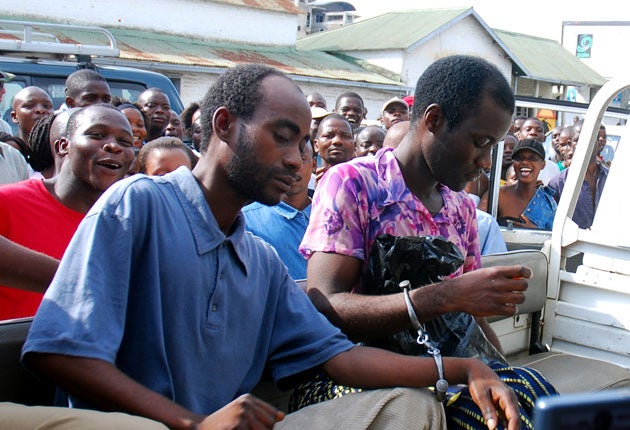Malawi convicts couple for being gay

Your support helps us to tell the story
From reproductive rights to climate change to Big Tech, The Independent is on the ground when the story is developing. Whether it's investigating the financials of Elon Musk's pro-Trump PAC or producing our latest documentary, 'The A Word', which shines a light on the American women fighting for reproductive rights, we know how important it is to parse out the facts from the messaging.
At such a critical moment in US history, we need reporters on the ground. Your donation allows us to keep sending journalists to speak to both sides of the story.
The Independent is trusted by Americans across the entire political spectrum. And unlike many other quality news outlets, we choose not to lock Americans out of our reporting and analysis with paywalls. We believe quality journalism should be available to everyone, paid for by those who can afford it.
Your support makes all the difference.A Malawi gay couple have been convicted of having a criminal relationship and could face up to 14 years in jail under the country's colonial-era laws.
They were found guilty of unnatural acts and gross indecency after a trial that drew worldwide condemnation.
Steven Monjeza, 26, and Tiwonge Chimbalanga, 20, had been jailed since their arrest on December 27, the day they celebrated their engagement with a party that drew crowds of curious, jeering onlookers.
Blantyre Chief Resident Magistrate Nyakwawa Usiwa said the sentencing will take place on Thursday.
Hearings in the trial also have drawn Malawians who have ridiculed the couple, an indication of views on homosexuality in the traditional society - and elsewhere in Africa.
Homosexuality is illegal in at least 37 countries on the continent. In Uganda, MPs are considering a bill that would sentence homosexuals to life in prison and include capital punishment for "repeat offenders."
Even in South Africa, the only African country that recognises gay rights, gangs have carried out so-called "corrective" rapes on lesbians.
Michaela Clayton of the South Africa-based Aids & Rights Alliance for Southern Africa said not only were human rights being violated, but the fight against Aids was being hurt. Gay people forced underground were unlikely to seek counselling and treatment for Aids, she and other activists said.
She said gays and other minorities in Africa had in recent years become more assertive about their sexual orientation and about claiming their rights, which could have led to the backlash.
"We have to keep on being strategic about the way we push this agenda forward," she said.
Priti Patel of the Southern African Litigation Centre, an independent rights group, said the Malawians could appeal on the grounds that the laws under which they were prosecuted violate the country's 1994 constitution. But an earlier attempt by their lawyer to have the case thrown out on those grounds was rejected.
Malawi's government has been defiant in the face of international criticism over the prosecution. Months before the verdict, Information Minister Leckford Mwanza Thoto said it was clear the two had broken the law.
Malawi church leaders have backed the government, saying homosexuality is "sinful" and the West should not be allowed to use its financial power to force Malawi to accept homosexuality. Malawi relies on donors for 40% of its development budget.
London-based human rights campaigner Peter Tatchell who has been following the case said: "This is an outrageous verdict. While Steven and Tiwonge freely confirmed their love for each other, there was was no credible evidence that they had committed any illegal homosexual acts.
"The law under which they were convicted is a discriminatory law that only applies to same-sex relations. It is unconstitutional. Article 20 of Malawi's constitution guarantees equality and non-discrimination.
"Malawi's anti-gay laws were not devised by Malawians. They were devised in London in the nineteenth century and imposed on the people of Malawi by the British colonisers and their army of occupation.
"I expect both men will now appeal against the verdict and against any sentence that is handed down. Steven and Tiwonge's best hope is that a higher court will overturn this unjust, cruel verdict."
Join our commenting forum
Join thought-provoking conversations, follow other Independent readers and see their replies
Comments